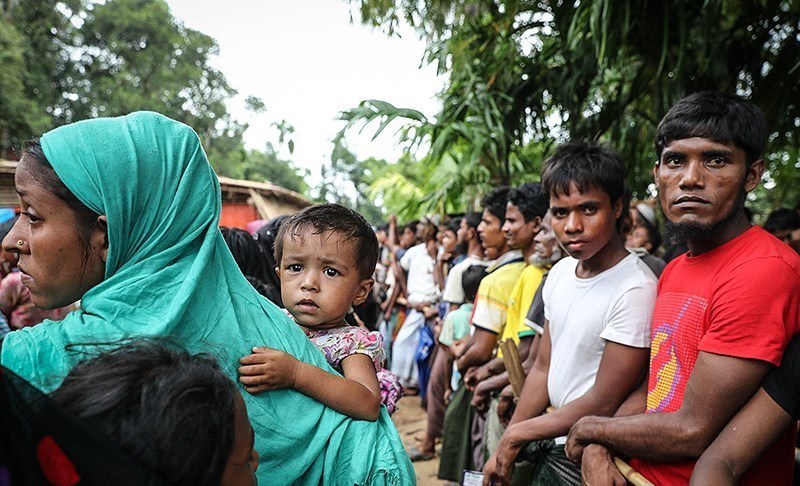
Awbuck Qandoe
New Delhi, December 5, 2020: When a small fleet Bangladesh Navy ships, crammed with 1,642 Rohingya refugees from Myanmar, set sail from the coastal city of Chittagong towards the isolated island of Bhashan Char on December 4, there was an outcry from the international community.
How on earth could the Bangladesh government take such a harsh decision – parcelling poor refugees to an island that is flood-prone and cyclone-prone?
Surely, that’s a heartless call? Can’t they continue hosting them in mainland Bangladesh till Myanmar’s war on the Rohingya people is over?
The United Nations (UN) has asked these questions.
So did Amnesty International.
Human Rights Watch (HRW) has also followed suit.
Refugees International, too, isn’t amused with the move.
The UN has said that it has been given “limited information” about the Bangladesh government’s decision to start relocating Rohingya refugees to this newfound island of Bhashan Char, and it wasn’t consulted for the logistical preparations.
Amnesty has been more straightforward, demanding that “the authorities should immediately halt the relocation of more refugees to Bhashan Char, return those on the island to their families and community in mainland Bangladesh, and follow due process including the full and meaningful participation of refugees in any plan for their relocation”.
HRW has complained that the administration in Dhaka is “yet to provide convincing assurances that the refugees will be safe there, and their freedom of movement and right to livelihood protected”.
Refugee International is of the same opinion, saying, “Serious questions about safety and voluntariness of such a relocation remain unanswered.”
It’s fair enough that these well-known and widely respected international watchdogs have blown the whistle on what’s happening in the Bay of Bengal off the Bangladesh coast.
The facts on the ground – rather, out in the sea – are tell-tale and extremely alarming.

First, here’s the Rohingya story in a nutshell.
What is known as the Rohingya refugee crisis began in 2015, when Myanmar launched a military crackdown on Rohingya Muslims living in the country’s Rakhine state.
The persecuted Rohingyas were forced to flee their country to avoid death, desperately seeking refuge in neighbouring countries. A large majority of them set sail on dilapidated boats and reached the Bangladeshi coastal town of Cox’s Bazar. The number of impoverished refugees camped there has since then kept swelling, now reaching a whopping 1.2 million.
The Rohingyas made it to some other countries too, many of which had to reluctantly host them, some even labelling them as illegal immigrants. These are Malaysia, India, Indonesia, Laos, Cambodia, Philippines, Thailand and a few others.
It was finance-starved Bangladesh, however, that has hosted most of them. So to take the expanding population load off Cox’s Bazar, the Bangladesh Navy zeroed in on the island of Bhashan Char, where the long-term plan is to relocate at least 100,000 Rohingya refugees.
Now comes the actual problem. And it’s got to do with the venue – the forbidden island.
Bhashan Char is basically a small unstable island made entirely of silt that lies about 60km from mainland Bangladesh. The silt island emerged from under the sea in the Bay of Bengal less than 20 years back.
The island barely spans 40 square kilometres. It is notorious for being routinely swept by seasonal floods and bears the brunt of devastating cyclones that are commonplace in the region.
Basically, the isolated island has never been inhabited ever since it was ‘born’ – except for 300 Rohingya refugees who were only earlier this year transported there by the Bangladesh authorities on an experimental basis – to gauge if the mass relocation would at all work.
It’s true that Dhaka spent a good 100 million dollars to make the unprotected and unstable island ‘livable’ – building over a thousand homes, storm shelters and flood embankments.
But a silt island that came up just some years ago could jolly well vanish into the depths of the sea in the event of any major natural calamity, be it an earthquake, a tsunami from it, or a super-cyclone – the island is just silt, after all.
It’s as gruesome and terrifying as any experiment in human relocation can be. Even guinea pigs would be sighing in relief.
Now, the larger and more uncomfortable question here is not why Bangladesh is doing this insane thing to the Rohingya refugees. It’s not about why the world should or shouldn’t take the government in Dhaka to task.
It goes well beyond that.
The larger question is – what on earth is the global community doing to save the Rohingyas from being packed off from overcrowded Cox’s Bazar refugee camps to this island of death?
It’s not that they aren’t aware of the misery. There’s been so much big talk from international monitors and whistleblowers. The UN, Amnesty, HRW – they have all hollered out grandiose statements on the unfolding crisis. On their websites. Through media statements. At press conferences. On social media platforms.
But why is the affluent world, with all its worldly wealth and capacity to easily host all of the 1.2 million Roingya refugees stuck in Bangladesh, watching only from the sidelines and not doing anything?
Dear Empire, this ain’t a spectator sport. This is a calamity that needs your physical and logistical involvement. Won’t you follow up on your grand promises on helping the distressed that echo within the plush walls of the United Nations?

The US, China, UK, Japan, Italy, Saudi Arabia, Australia, Canada, Switzerland – some of the world’s most influential economies – could simply nip it in the bud by hosting the refugees. There would be no need for cash-strapped, overpopulated and economically-struggling Bangladesh to look for sub-human and inhuman camp sites out in the sea, isn’t it?
Where are the great powers, the great, sensitive, culturally-evolved empires of our times?
Maybe these empires don’t want to get their hands dirty. We often tend to forget that the world is a place mired in obnoxious migration laws. Those who are genuinely distressed in the Global South and who are not required for geopolitical gains are by default unwelcome to the Global North.
The major economies of the world have an interesting stance on humanitarian issues.
They break into tears over Chinese misrule in the Uighur region.
They are appalled by bombing campaigns being carried out in Yemen.
They are left shaken by regressive Islamic regimes in West Asia.
They grimace at the sight of mass malnutrition across Africa.
They lose their temper over Indian minorities losing their rights.
The West, of course, at least makes some noise. Look at the powers from the East – China, Japan and South Korea. Their approach is different from that of the West. The prefer complete silence as they watch from a distance.
You hardly ever hear them remark and take a constructive stand on humanitarian issues around the world, especially the Chinese.
The point here is, ask these global powers to host just 1.2 million Rohingya refugees – or at least marshal the affluent countries that can afford to host them – and they simply go invisible.
They step back into their safe confines and send out an army of humanitarian bodies – those wonderful ones cited above – to dish out the “we are concerned” and “we are watching” statements.
That doesn’t at all mean Bangladesh has to be let off – no way. Packing 100,000 people off to an insanely dangerous silt island is an atrocious idea. The writing is on the wall.
But where are all the well-fed, well-meaning empires of the world that can actually make a difference? Too busy scripting statements of condemnation?
Today, December 5, is being observed as World Soil Day. It’s an irony as dark as can be that while we mark World Soil Day, we sit back and watch the Rohingyas being condemned to a new and unknown land made of silt, not soil – the island of death.
Looks like World Soil Day is meant to smirk at people shrieking in horror on precious, precious soil slipping away from under their feet.










Humanity emerges only at personal level.International Organisations that hails themselves as the saviour of
humanity, has literally failed at the outset,
to rescue Rohingyas, as that feel of kindness can’t be had with ORGs, GRPs
or INSTITUTIONs.
Thanks for sharing your thoughts.